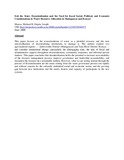| dc.contributor.author | Marcus, Richard R | |
| dc.contributor.author | Onjala, Joseph | |
| dc.date.accessioned | 2013-07-10T06:49:32Z | |
| dc.date.available | 2013-07-10T06:49:32Z | |
| dc.date.issued | 2008 | |
| dc.identifier.citation | Journal of Human Development Volume 9, Issue 1, 2008 | en |
| dc.identifier.uri | http://erepository.uonbi.ac.ke:8080/xmlui/handle/123456789/46977 | |
| dc.description.abstract | This paper focuses on the iconoclasticism of water as a plentiful resource and the near universalization of decentralizing institutions to manage it. The authors explore two agro‐pastoral regions — Ambovombe District (Madagascar) and Tana River District (Kenya) — and consider institutional change, particularly the disengaging state, the lack of fiscal and administrative support throughout decentralization, community responses, and informal private markets. This paper concludes that decentralization holds the potential to increase accountability of the resource management process, improve governance and leadership accountability, and maximize the resource in a sustainable fashion. However, what we are seeing instead through the process of decentralization are the states exiting from the water governance process too rapidly and without concern for the culturally embedded social and economic norms, and the growing gap between new institutions and the needs, desires, and capacity of participants in the new systems. | en |
| dc.language.iso | en | en |
| dc.subject | Governance | en |
| dc.subject | Decentralization | en |
| dc.subject | Water | en |
| dc.subject | Kenya | en |
| dc.subject | Madagascar | en |
| dc.subject | Africa | en |
| dc.title | Exit the State: Decentralization and the Need for Local Social, Political, and Economic Considerations in Water Resource Allocation in Madagascar and Kenya1 | en |
| dc.type | Article | en |
| local.publisher | Institute For Development Studies | en |

